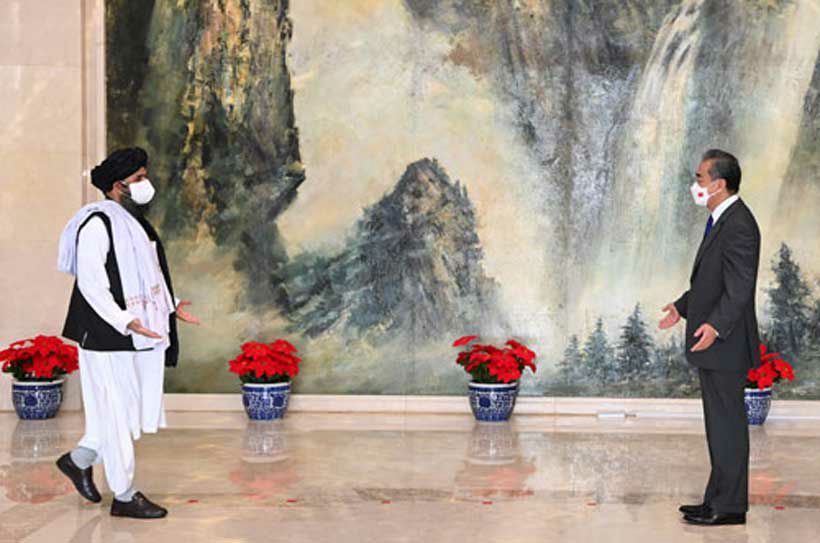Power Distribution in Taliban and China’s Role
China and Pakistan need the Taliban regime in Afghanistan to be maintained in order to promote their infrastructure and economic projects in the region. In this regard, both countries provide diplomatic and economic support to the Taliban

The Taliban’s power in Afghanistan is still strong and does not tend to fall in the near future. Nonetheless, the political situation continues to worsen. There are no proposals or possibilities for the Taliban government in Afghanistan to be acknowledged any time soon. The power within the radical Taliban movement holds a stable position even with the current contradictions and conflicts among elite groups. China’s diplomatic activity contributes to this as Beijing seeks to elevate its economic and structural objects in Central Asia. However, the excessive support of Pakistan and China for the radical Islamist movement, which uses terrorism as an instrument of a political war for power, entails negative consequences concerning the region. Georgi Asatryan, a Modern Diplomacy social scientist, political theorist, and member of the International Studies Association, wrote about this in a comment.
There have been changes in the political landscape of Afghanistan in 2023: the Taliban strengthened their power under the leadership of Hibatullah Akhundzada. The leader of the Taliban movement retained control over decision-making processes, including the appointment of Maulvi Abdul Kabir as the new acting prime minister and the relocation of the center of power to Kandahar. This was partly due to the support from Beijing and the Pakistani military circles.
According to the statements of Central Asia regional experts, the Taliban rule is gradually adopting more authoritarian positions and resembles the dogmatic policy of the 1990s. These conclusions are confirmed in the recently released annual UN Analytical Support and Monitoring Teem report for the UN Security Council Committee. The report also mentions that the return of Kandahar as a center of power, as it was during the Taliban rule in Afghanistan in the 1990s, is bypassing the opinion of high-ranking Taliban officials in Kabul, the center of the current government.
For example, such harsh decisions as the ban on education and employment of women and girls were issued in Kandahar, not in the capital. According to the document, the Taliban is fighting an internal conflict over the policy of centralizing power and control over Afghanistan’s financial and natural resources. It is reported that the ongoing power struggle is destabilizing the situation to such an extent that there is a risk of an outbreak of armed conflict between competing factions. Taliban spokesman Zabihullah Mujahid rejected the “accusations” outlined in the document, saying they were groundless and demonstrated “clear hostility” towards the Afghans. According to him, rumors of disagreements between the leaders of the Taliban continue the propaganda of the last 20 years. “The publication of such biased and baseless reports of the Security Council does not help Afghanistan, does not contribute to international peace and security, but rather increases anxiety among people.” The UN report describes Taliban leader Akhundzada as a “reclusive and elusive.” It is also said that he takes carefully considered steps to ensure his safety during meetings. Last year’s annual report of the UN Security Council group noted that handwritten messages, minimal use of a mobile phone, and face-to-face meetings are the main ways to conceal the location of the Taliban leader. Among other things, the report cites a statement by an unnamed member state of the UN Security Council, which states that Akhundzada got COVID-19 twice, due to which his respiratory system was weakened and kidney problems worsened. This suggests that senior Taliban leaders are waiting for the emir’s health problems to lead to a “natural succession.” Statements about Afghanistan’s entry into the China-Pakistan Economic Corridor project have been repeatedly published by Pakistan and China.
Over 3 million people Acutely Malnourished in Afghanistan: WFP
DID Press: UN’s WFP says over 3 million people are currently malnourished in Afghanistan.
WFP aanounced Monday that last month, it supported 367,000 women and children with specialized nutritious food to prevent or treat malnutrition.
According to WFP report, 15.3 million people are projected to be acutely food-insecure between May and October 2023, including 2.8 million people in Integrated Food Security Phase Classification (IPC) Phase 4 (Emergency)
3.2 million people are acutely malnourished, including 3.2 million children younger than 5 years old, the report added.
On the other hand, 28.8 million people – two-thirds of Afghanistan’s population – require multi-sectoral humanitarian assistance in 2023.
This comes as the UN vowed it will run out of budget to support the people by October.
At the same time, Afghanistan is an official member of Beijing’s broader initiative called One Belt, One Road. However, no actual progress was made until the Afghan Government made a decision relatively recently. Despite the above, China remains steadfast in its intention to increase diplomatic and economic relations with both sides.
Thus, China and Pakistan need the Taliban regime in Afghanistan to be maintained in order to promote their infrastructure and economic projects in the region. In this regard, both countries provide diplomatic and economic support to the Taliban. However, it also leads to unrestrained Taliban, who apprehend and feel profound support and strength and begin to tighten the policy, which is becoming more aggressive.